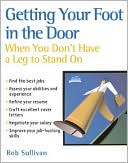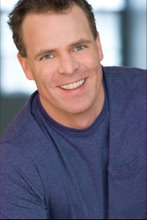I could not be more excited to present this Q&A with Rob Sullivan because I think of him as my doppelganger in terms of using storytelling in the job search; we are twins separated at birth — except I think he’s probably quite a bit younger than I am. In any case, we are storytelling-in-the-job-search soulmates. He even wrote a book with a title similar to one of mine!
Bio: Rob Sullivan is an inspirational speaker and corporate trainer who has delivered workshops and keynotes at companies, universities, and trade associations across the country including TAP Pharmaceuticals, McDonald’s, Motorola, Northwestern University, and the University of Michigan. His passion is helping people recognize, leverage, and communicate the gold in their backgrounds.
Rob’s book, Getting Your Foot in the Door When You Don’t Have a Leg to Stand On (McGraw-Hill, 4th Printing), has already begun to replace top-selling What Color is Your Parachute? as a text in college career-development courses.
Rob has delivered numerous commencement speeches and been a repeat guest on television and radio stations across the country including NBC, ABC, and WGN. He was also featured in the Wall Street Journal and as a guest expert on Starting Over, an Emmy-award winning reality show that airs nationally on NBC.
 Rob has a BA in psychology from the College of the Holy Cross in Worcester, MA, as well as an MS in advertising from Northwestern University’s Medill School of Journalism.
Rob has a BA in psychology from the College of the Holy Cross in Worcester, MA, as well as an MS in advertising from Northwestern University’s Medill School of Journalism.
He blogs at Storysparking and is a career practitioner at Career Craftsman, where he also offers several e-books. Rob has also just launched the site, RIFProofing as a companion to his e-book, RIFProofing Your Career (RIF stands for “Reductions in Force”).
Q&A with Rob Sullivan:
Q: Among all the practitioners I’ve interviewed in this series, you are the one closest to being a kindred spirit in terms of storytelling in the job search. How did you come to discover the effectiveness of storytelling in job-hunting?
A: I learned the effectiveness of storytelling by experiencing the pain that comes from not telling my story.
When I graduated from college, the job I wanted most was to work in account management at Chicago-based advertising giant Leo Burnett. Like hundreds of my classmates, I applied for one of the coveted on-campus interviews. Despite an objectively terrible interview, the recruiter saw enough of a spark that he invited me to fly to Chicago for a full day of interviews. Two weeks later, Burnett rejected me. Over the next 12 months, I had 80 advertising interviews in Chicago, New York, and Minneapolis. The following year, I reapplied to Burnett and was hired after my 23rd interview with the company. However, I was not a different person than I had been the year before. The only difference was that I had learned to tell my story.
As it turned out, there wasn’t a single moment or resource that opened my eyes to the value of storytelling. Instead, I gradually realized that the best interviews were the ones in which my story came across more clearly. At first, that made me think that my success was directly related to the skill of the interviewer. Only later did I realize the power and responsibility that I, as a candidate, had to make sure my story came across — regardless of the interviewer’s approach. Simply put, you can’t count on interviewers to ask effective questions. You have to have a strategy and a compelling collection of stories to help people make the right decision.
After spending countless hours helping job hunters from a variety of industries, I realized that the inability to share our stories is widespread – mostly because our society isn’t clear on the distinction between bragging and factual self promotion. For this reason, I decided to write Getting Your Foot in the Door When You Don’t Have a Leg To Stand On (McGraw-Hill). It’s the book that would have saved me from the ego-battering experience job hunters know only too well.
Recognizing that the challenge of marketing yourself effectively does not stop when you get a job, I recently finished a new eBook called RIFProofing Your Career: How to Protect and Keep Your Job in Any Economy. For more information, visit its companion site.

